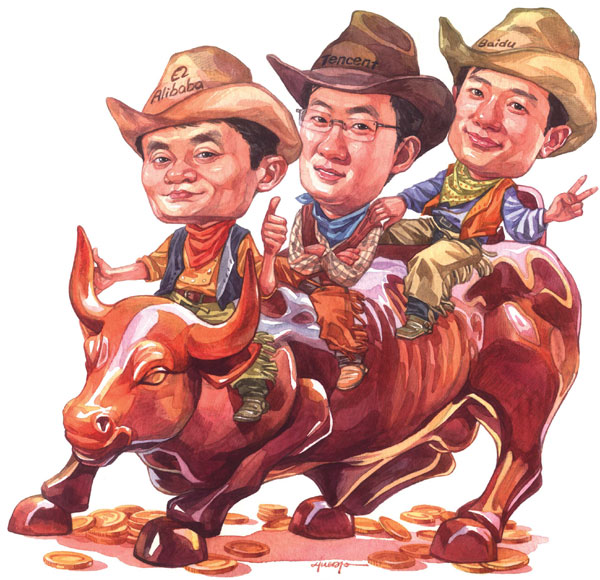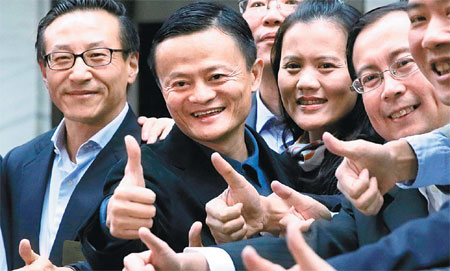Charge of the internet bulls
Updated: 2014-09-26 09:04
By Meng Jing(China Daily Europe)
|
|||||||||||

The IPO of Alibaba Group has made more than just Jack Ma happy
A few hours before Alibaba Group made its debut on the New York Stock Exchange, Jack Ma, the company's main founder and chairman, said Sept 19 would be a "life-changing day" for its 20,000 employees.
That day the Hangzhou-based e-commerce conglomerate raised more than $25 billion in the largest IPO in history, instantly making thousands of the company's employees fabulously rich. The market capitalization on the first day of its trading exceeded $200 billion - more than that of Amazon and eBay combined - and stock incentives Alibaba offers its employees means that there is $44.8 billion to divvy up between 11,000 of them. Each of the more than 300 people in senior positions is now worth more than 100 million yuan ($16.3 million).
The 500,000 yuan that Ma and 17 other partners invested 15 years ago has made the 50-year-old China's richest individual, with a net worth of $21.8 billion, according to the latest Bloomberg Billionaires Index. The Hurun China Rich list published on Sept 24 calculated his wealth to be higher than that, at $25 billion.
Whatever the true figure, those lists serve to underscore not only Ma's growing wealth but also the fact that the top ranks of Chinese wealthy are beginning to swell with those who have become rich through Internet-related businesses.
Pony Ma, the founder of Tencent Holdings Ltd, the Shenzhen-based giant well known for its mobile messaging app WeChat, and Robin Li, founder of China's largest search engine, Baidu, rank second- and third-richest individuals in the world's second-largest economy.
The Internet is thus proving to be a breeding ground for China's next generation of billionaires.
Justin Ren, associate professor of Operations and Technology Management at Boston University School of Management, says two major factors are behind the phenomenon.
"The first is China's rapid growth. As its share of global GDP grows, its richest billionaires will rank higher and higher on the global list. The second is the explosive growth of the Internet economy in China. As its share of the economy grows, it will spawn ever more billionaires."
According to a study by McKinsey Global Institute, the business and economics research arm of global consulting firm McKinsey & Co, the Internet sector could add 0.3 to 1 percentage points to China's GDP growth every year until 2025.
This could fuel about 7 to 22 percent of the incremental GDP growth until then, translating into 4 trillion yuan ($650 billion) to 14 trillion yuan in China's annual GDP by that point.
What is happening with wealth creation through the Internet is not confined to China, experts say. The same thing has happened in Western countries, Ren says.
"In the US, for example, the richest people used to be from 'old industries' such as automotive, banking, oil or steel. Then along came Bill Gates, who became a billionaire in less than 20 years after founding Microsoft. After that, Mark Zuckerberg made the list less than 10 years after he set up Facebook.
"So in this respect China is following the same pattern. However, consistent with the faster pace of China's economic development compared with the rest of the world, those billionaires may have made their riches faster than their Western counterparts."
On the latest Hurun China Rich List, Ma of Alibaba, with his $25 billion fortune, became the 11th man in the list's 16 years to rank No 1. His wealth is five times what it was last year.
Apart from him, there are four new faces in the top 10 on Hurun's list: renewable energy magnate Li Hejun of Hanergy; Yan Jiehe of China Pacific Construction; Liu Qiangdong of JD.com, an e-commerce company and Alibaba's main competitor in China; and Lei Jun of Xiaomi Corp, a smartphone maker.
Rupert Hoogewerf, the chairman and chief researcher of Hurun Report, says the fast-changing list underlines how dynamic the Chinese economy is, and is a stark reminder of the growth that is being realized in emerging markets.
Ten years ago there was only one Chinese individual with wealth of more than 10 billion yuan; today there are 176.
"What is more amazing is that the entrepreneurial spirit that has enveloped China shows no sign of abating, with eight self-made individuals born in the '80s making the list. Any country would be proud of that."
The IT sector billionaires who have made it into the top 10 on the Hurun list this year have done so partly at the expense of real estate billionaires, who last year occupied the most places. Their representation on the list has fallen from six to two.
Chiang Jeongwen, professor of marketing with China's business school CEIBS, says the country's property tycoons are byproducts of abnormal activity in the real estate industry, activity that occurs partially because of misguided actions by central and local governments.
"As the market has been suppressed and the bubble burst, these tycoons have fallen in the rankings or disappeared all together." The pecking order among China's billionaires has changed much more quickly than have the rankings among Western billionaires, he says.
Half of China's population has mobile devices, he says, and easy access to the Internet is helping all kinds of companies in this sphere to flourish provided that they have good content, products or offer great experience to users.
"So I would say the rise of the Internet billionaires is a natural result of the rapid growth of mobile devices and comprehensive, countrywide telecommunications networks."
However, even if the thriving Internet sector almost guarantees that more multimillionaire Internet entrepreneurs are on the way, that does not necessarily mean they will be able to hold on to their riches, Ren says.
"How large the new Internet economy will become and how it will do it is hard to gauge. It is very likely that new players will arrive on the scene and disrupt the economy again, much like what Jack Ma did with Alibaba."
One of the biggest challenges for China's Internet companies is the sheer speed with which the business is changing, he says.
"That means it is extremely difficult to build an enduring company on the Internet."
Adam Xu, a partner who leads strategy and digital and consumer practice with management consulting firm Strategy&, a member of the PricewaterhouseCoopers network of companies, says the increasing pace of change includes potentially disruptive competitors entering the fray, which means competition from outside the sector.
"Not long ago, Sina Weibo, the Chinese version of Twitter, was all dominant, but it is rapidly being marginalized by Tencent's WeChat. Will Alibaba's Taobao and Tmall always dominate China's ecommerce? Will Alibaba's Alipay continue to be the main online payment device? I reckon that every day Jack Ma has something to worry about. Mobile Internet is also changing the game. We just do not know what the next technology shift will be.
"In today's Internet world, the so-called competitive advantages or moats are increasing and are becoming more fragile. So Alibaba, Baidu and Tencent will always need to be on top of technology trends and disruptive forces, and will need to take preemptive measures to hedge the risks."
However, Chiang of the Shanghai-based CEIBS has a different take. New Chinese billionaires will appear, but it is unlikely they will rank above Jack Ma, Robin Li or Pony Ma in the foreseeable future, he says.
The huge scale of Alibaba, Baidu and Tencent combined took years to build, and today's operating environment is not the same as it was in those days.
"So it's unlikely any newcomers will achieve the level of success that they did. As to billionaires from other sectors in the near future, the health sector might have a chance because healthcare is a necessity for every Chinese, young or old. A dominant player in this field may achieve the same results as Alibaba, Baidu and Tencent or even better them."
Chiang says the top challenge for the increasingly rich Internet business giants is to avoid becoming too big for their own good like a government bureaucracy or some other rigid institution.
"The entrepreneurial spirit and the ability to be fast-moving and quick to adapt to customers' needs are the two most important ingredients of their success. They cannot afford to lose that."
Talent is also a vital component, Chiang says. Recruiting and retaining top talent is the key to ensuring smooth succession and driving prosperity.
Until quite recently China's domestic Internet companies have not been seen as top choices for job seekers compared with stable positions with state-own enterprises and high-paid multinational companies, but their reputations have improved.
Alibaba has overtaken Microsoft Corp to rank the first this year in the Top 50 Best Employers for College Students, according to an annual survey done by the Chinese research organization Horizon Research Consultancy Group.
According to the survey, published in August, the top 10 employers for college students were Alibaba, China Mobile Ltd, Bank of China, Apple Inc, China Telecom, Huawei Technologies Co Ltd, Baidu Inc, China National Petroleum Corp, Tencent Holdings Ltd and State Grid.
Jason Wu, managing partner of the recruitment company Experis, part of ManpowerGroup, says the attraction of Internet companies has started to grow in the past two or three years as the sector has begun to look more and more promising.
Apart from Alibaba, Baidu and Tencent, some smaller Internet companies or even start-ups have attracted the attention of high-quality talent not only because of the flexibility in their corporate culture but also because, with IPOs in their sights, they offer stock incentives much like Alibaba, Wu says.
Offering stock incentives is a common practice, particularly for technology companies, because it is a good way of keeping important members of staff before the company is making a profit.
"If the company offers large salaries before it makes a profit, then the costs of running a start-up firm become very high," says Neil Flynn, head equity analyst at chineseinvestors.com of Shanghai, a financial analysis firm of US-listed Chinese companies. Offering stock incentives is one of avoiding this, he says.
However, retaining and motivating shareholding employees can be problematic if, as in the case of Alibaba, they have suddenly become extremely rich because of an IPO.
The company has admitted its concerns, saying of staff in its IPO prospectus: "This wealth could affect their decisions about whether or not they remain with us."
Flynn says: "This is an issue that technology firms have endured in the past, and they will continue to do so."
However, another way of looking at this is that Alibaba was relatively unknown in the West before its IPO plan was announced.
"It is now internationally recognized as an ecommerce giant," Flynn says.
"This will give it the ability to hire top talent without the need to offer generous stock incentives."
The exposure Alibaba gains and the money it makes from the IPO will make it a direct rival to the likes of Google and Facebook.
Baidu is an example of this trend. It snatched former Google scientist Andrew Ng as chief scientist in May. And in September, the Beijing-based company confirmed that it had hired Microsoft's top China executive, Zhang Yaqin, who will become Baidu's president for new business.
Chinese Internet companies have war chests that are allowing them to catch up quickly with Western Internet giants. The question for those who watch rich lists is whether a Chinese Internet tycoon will one occupy top place, like a latter day Bill Gates.
Just like the role of steam engine and electricity in the history of economic development, experts and insiders say the Internet sector will bring the Chinese economy to a new level by enabling and empowering more innovation.
But the chances of someone from China who makes his or her money online becoming the world's wealthiest individuals requires not only a corporate juggernaut but also the country to have a flourishing and extremely sturdy Internet market.
Chinese Internet companies have often piggybacked on the US to come up with "original ideas", even if Chinese entrepreneurs have been adept at tailoring these ideas to their own market. The pure US model continues to look ill-suited to China. That means that as the country's largest Internet companies continue to grow, Western Internet companies in China have no choice but to adapt and change. However, their progress in China, if any, will be slow and they will probably be marginalized as niche players, says Chiang of CEIBS.
Xu of Strategy& says any Internet product needs to be tailored to user habits, and Chinese entrepreneurs are much more attuned to the habits of their compatriots. That means that they can easily tweak Internet products, services or business models.
"But for Western Internet companies headquartered in the US or elsewhere, the decision-making in China is always too slow," Xu says.
"China's Internet regulations and the scrutiny that content undergoes is hard for Western companies to swallow. Then there is the difference in language and culture, which makes it more difficult for Western Internet products and services."
Indeed Chinese Internet companies have performed well in competing against Western companies that have tried to get into China. Among the Western companies that have had to face the full force of Chinese competition are some of the Internet's biggest names: Amazon, eBay and Expedia.
However, outside China, the boot has been on the other foot, and it remains to be seen whether many Chinese Internet companies can have anything more than limited influence, Ren says.
"Will the Chinese Internet companies be successful on the world stage? It is possible, but the odds are not in their favor. Becoming an established global business requires strong institutional support from the home country: Its financial, legal, particularly those related to intellectual property, taxation and education systems all need to function well so companies can thrive. In this respect, China's companies have a long way to go."
Shi Jing contributed to this story.
mengjing@chinadaily.com.cn
|
Alibaba Group Holding Ltd founder Jack Ma (second left) at the New York Stock Exchange for his company's IPO on Sept 19. Brendan McDermid / Reuters |
|
Four new faces in the top 10 on the latest Hurun's list, from left: renewable energy magnate Li Hejun of Hanergy; Yan Jiehe of China Pacific Construction; Liu Qiangdong of JD.com, an e-commerce company, and Lei Jun of Xiaomi Corp, a smartphone maker. Photos Provided to China Daily |
(China Daily European Weekly 09/26/2014 page1)
Today's Top News
UK to join airstrikes against IS in Iraq
Qatar forfeit basketball game
Russia turns to RMB to thwart Western sanctions
Express delivery sector opens up
China rebuffs EU on condemning life sentence
Emissions report tells only part of story, expert says
India triumphs in Mars mission
iPhone smugglers targeted
Hot Topics
Lunar probe , China growth forecasts, Emission rules get tougher, China seen through 'colored lens', International board,
Editor's Picks

|

|

|

|

|

|







